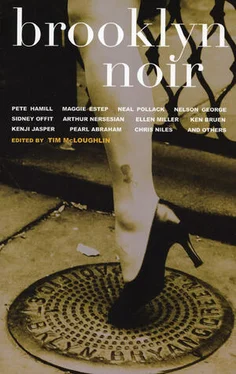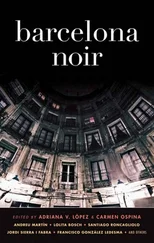“Now sit him up and hold the towel. The blood is slowing down. He’ll be fine and so will you.”
Rosa looked down at the wound and saw that the bleeding had slowed to a trickle. She sat down on the couch and gently held the towel as Mama went into the kitchen.
Rosa sat up on the couch, afraid. The room was dark. Had she slept? She blinked and saw Carlos leaning against her, breathing slowly. She heard a tapping on glass and saw the silhouette of a man trying to look into the window. The shadow moved, and then silence. She just sat there not moving — hardly breathing — when someone banged on the front door. In the hallway she could see Mama opening the door and say, “Sí?”
Then Mama flew back against the wall as a young Latino man stormed into the apartment, yelling, “Where’s that cobarde Carlos?”
The man looked down the hallway and came at her. She saw he had a gun, and Rosa closed her eyes. This is what Carlos has given me. A cheap, stupid death in a ghetto apartment. Rosa jumped as a shot rang out. She heard a moan, and then another shot. She opened her eyes and saw Mama standing over the body of the man. Mama held a black revolver in her hand.
“There, that’s for you! You come into my house to kill mi bebe You pendejo. Cheap-ass bandido…” Mama kicked the man, then smiled at Rosa. “How’s Carlos?”
“Is he dead?”
“Him, yeah. Come help me drag him into the bañera.”
“Why are you taking him to the bathtub?”
“Why you think? Think I want to clean him up? We got to get rid of this body. Come on.”
Mama grabbed the man’s feet and Rosa stood up. She stared at Mama. Mama dropped the feet and walked over and slapped Rosa in the face.
Mama yelled, “You do as I say! You hear me? You brought this here, and you will help me. Now!”
Rosa bent down robotically and took the man by his boots as Mama grabbed the arms. They dragged him down the hall, leaving a trail of blood on the linoleum. Rosa looked down into the dead face and saw he’d been no more than a boy — maybe eighteen. Why was he dead? What was she doing here?
“In here.” Mama motioned to the bathroom door. Rosa kicked it open, and with great effort she and Mama lifted the man into the tub and dropped him.
Mama smacked her hands and said, “Got to get rid of this body.”
Rosa wanted to scream and run, but she just said, “No.”
“Go and get Papa. He’s down in the bodega playing dominos. Tell him we need to turn up the furnace all the way. We have something to burn.”
Rosa didn’t move and just stared at Mama.
“Rosa, go. Now! Avanza! And come back. Don’t think of going to the cops, because you touched the gun. Your finger-prints are all over that gun. You’re one of us now. I hope mi hijo picked a good one.”
Mama reached into a hall closet and smiled when she turned. “What, you want to watch?” She had a small axe in her hand. She motioned with the hatchet for Rosa to get going. Rosa dully nodded, put on her coat, and opened the door. She moved out of the apartment and floated down the hallway. She opened the lobby door and stepped out into the cold night air and stood on the stoop staring out at the Bushwick street. A gypsy cab cruised by and the driver stared at Rosa. She turned away and saw a shadow move in the alley across the street.
Rosa let out a long sigh and walked down the block, feeling like her body and soul were dying. She would never get out of this neighborhood.
Ladies’ man
by Chris Niles
Brighton Beach
She was lush like an old-time movie star in black patent-leather shoes, fishnet stockings, and a fur coat. Her hair had been blonded, rolled, sprayed, and teased so that it stiffly circled her face like a halo on a medieval Madonna. She had Angelina Jolie lips and her heavy-lidded eyes were shaded aqua and rimmed with kohl. Crimsondipped nails grasped fake Louis Vuitton. She didn’t look anything like Ana, but that didn’t stop me staring.
The rhythm of the train tempted her to doze. Her head dipped. She woke, glanced around, trying not to look anxious, yet tightening her grip on her bag. Falling asleep on the subway. Not a good idea. It was late. The car was filled with a typical assortment of booze-and drug-fueled crazies, myself included. I’d spent the previous few hours with a couple a friends of the family — Eric Ambler and Comrade Stolichnaya.
Brighton Beach, end of the line. She got out. I did too. I stumbled down the steep steps, my eyes blurry from the booze, but my ears sharply focused on the clip-clip of her stilettos She walked west on Brighton Beach Avenue, long strides. It was cold, few people around. I stuffed my hands in my pockets, fingers searching for the Marlboro I knew was lurking somewhere. My head was fuzzy, the cold seemed to be making me drunker. I lit the cigarette and kept pace.
I liked Brighton Beach, it reminded me of my old life. I liked the stores selling canned fish, the babushkas hawking homemade trinkets on the sidewalk, the signs in Russian, the shabby exuberance. After years of exile, the extravagance of Manhattan made me feel ill. Out near the sea, where the choices seemed simpler, I could think again.
She turned left onto a side street lined with nondescript brick apartment buildings. Clip-clip . My cigarette was ashes and the promise of cancer by the time we reached the board-walk. I tossed the butt, dodged dogshit. It was spring, but a vindictive wind taunted my exposed skin. I turned up my collar and wondered what shape she was under that big fur coat, what her voice sounded like, what she whispered when having sex.
We passed the handball courts. For an instant my attention was diverted by an old guy in a t-shirt sprinting along the boardwalk. In as long as it took me to think, Don’t these people ever feel the cold? the woman had gone. I spun around, looking, listening. She was nowhere.
Shrugging, I headed to Ruby’s for a drink before my shift began.
People don’t tell you this about New York: The reason some never leave is because you can burn up on re-entry. It was almost that way with me. I had tried to make my fortune, or at least my name, as a foreign correspondent, and had failed. Eastern Europe worked for a while and then it didn’t, so I headed to Southeast Asia for some professional relaxation. I could have stayed, I suppose, lolling on a beach in Thailand, but there were too many reminders there of the kind of person that I would become — a fat, feckless ex-pat who couldn’t have survived a day in any city of consequence. Eventually there was no choice but to make things hard for myself again. So I came back to New York.
I hit the tail end of the 1990s and found it was a very, very different city from the one I had left almost a decade ago. It was as if real journalism had died and nobody had given it a decent funeral. CEOs were now celebrities and all celebrities were gods. The scary thing was, nobody seemed to have noticed. In some sort of crazy bait and switch, all the vicious, crazy, thrilling, real live New Yorkers had been replaced by a bunch of plastic people. The women were a discombobulating combination of perky and dull. The men talked about business school as the high point of their existence. All of them believed that every so-called obstacle in their trivial lives could be overcome if only they put in enough hours at the office and hired a personal trainer.
I did not fit. I missed real people. People who know that life’s often unfair. That sometimes, through no fault of your own, things just don’t work out. So I shunned Manhattan and my old life. I took a job copy-editing, overnights. The pay was crap and the hours were worse. I didn’t care.
Читать дальше












